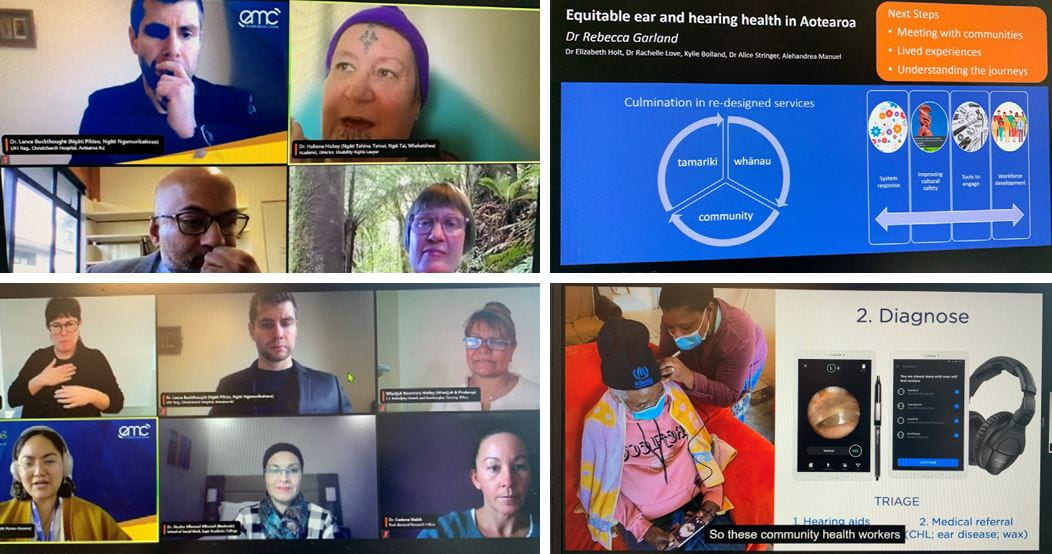Practitioners from around the world, working with D/deaf and hard of hearing communities joined members of the Eisdell Moore Centre for the first International Indigenous Hearing Health Symposium on 29 and 30 July.
Speakers from Aotearoa, Australia, the broader Western Pacific Region, and from North America, Asia and Africa generously shared their mātauranga and their experiences of being and/or working with Indigenous and D/deaf and hard of hearing communities.
Our keynote speaker, Prof. Kelvin Kong of the Worimi People and the first Aboriginal Fellow of the Royal Australasian College of Surgeons (RACS) Australia spoke of his ongoing experiences of racism and ‘microaggressions’ and of the institutional racism he sees within the system that his Indigenous patients must continue to work against. He also identified opportunities to overcome institutional racism by acknowledging and scoring the broader skillsets and lived-experience of individuals when recruiting for training programs. Our second keynote speaker, Dr Kirsten Smiler (Te Whānau-a-Kai, Te Aitanga-a-Māhaki, Rongowhakaata, Te Whakatōhea), a Māori Academic & Research Fellow at Victoria University Wellington spoke of the Pā Harakeke model that puts Whakapapa at the centre of the care of how indigenous knowledge must be incorporated into existing frameworks for early intervention and for ear and hearing care.
Panel discussions with Indigenous community leaders and allies spoke of their personal experiences of racism within the system that excludes indigenous people from accessing appropriate and timely care and of the ongoing impacts of colonisation and trauma that leads indigenous people to distrust the broader system.
D/deaf Indigenous people spoke of the clinical nature of the system, that does not take into account the whole person or show empathy for those that are diagnosed as D/deaf and where individuals feel like they are “on a conveyor belt”. The also spoke of the “double jeopardy” of being disabled and indigenous, of how they have to “pay to be hearing” and of how they have to fight the system for appropriate care.
Prof. Suzanne Purdy, Co-Deputy Director of the EMC, summed up the 2 day event as being an “intense and emotional couple of days”. But Valerie Swift, a Menang Gnudju woman who works with the Telethon Kids Ear Health Team in Western Australia said we need to celebrate the bright spots and the wins and there were a number of these through the 2 days. We saw that many researchers and clinicians have found a ways to work outside their comfort zones and “sit, listen and learn”; we heard from indigenous clinicians and researchers whose knowledge will support re-indigenisation of ear and hearing care; we learned about wonderful innovations being developed that bring together indigenous knowledge and technology to support healthy hearing in communities and we saw there are many allies and champions in the sector.
The Centre feels privileged to have provided this opportunity for our Indigenous and D/deaf and hard of hearing communities to share their voice and their mātauranga and we acknowledge Alehandrea Manuel, our Māori Research Coordinator for bringing this virtual event together. Alehandrea started her role at the Centre in 2019 with a vision to hold an International Indigenous Hearing Health Symposium and she has almost single-handedly brought this vision to fruition of the last few months. EMC’s Director, Prof. Peter Thorne feels “immensely proud that we have been able to help Aleh to realise her vision and bring the mātauranga, whakaaro and important kaupapa around Indigenous Hearing Health to the global community”.
Over 250 people registered for the symposium from around the world and presentations and panel discussions will all be available online, providing a rich repository of information for people to access. This information will be available here: www.indigenoushearinghealth.com. If you would like to access the content – please email us: emcentre@auckland.ac.nz for access and password details.
Special thanks to Ngā Pa o te Māramatanga for “powering” the symposium and to the University of Auckland for their ongoing support of the Eisdell Moore Centre.

Will the presentations be available to those who did not attend the symposium. Only a few staff from Ko Taku Reo Deaf Education were invited to attend but I believe that the content would be extremely valuable to many others.
Kia ora Angela – yes, we are going to send out a post-event registration for people to access the online material. The panel discussions need to be captioned, so it will take a week or two to get these online. I’m sorry that staff at Ko Taku Reo felt that a few were invited to attend – we had anticipated that organisations would share within their networks and that anyone that wanted to attend felt that they could, but perhaps this didn’t come through in our communications.